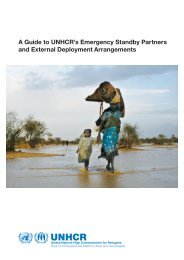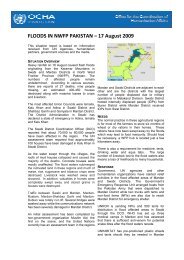Women, Girls, Boys and men - HumanitarianInfo.org
Women, Girls, Boys and men - HumanitarianInfo.org
Women, Girls, Boys and men - HumanitarianInfo.org
You also want an ePaper? Increase the reach of your titles
YUMPU automatically turns print PDFs into web optimized ePapers that Google loves.
Emergencies are often characterized by a high<br />
prevalence of acute malnutrition <strong>and</strong> micronutrient<br />
deficiency diseases, which in turn lead to increased<br />
risk of death among the affected population <strong>and</strong><br />
in particular among vulnerable groups. <strong>Wo<strong>men</strong></strong>, girls,<br />
boys <strong>and</strong> <strong>men</strong> face different risks in relation to a deterioration<br />
in their nutritional status in emergency contexts.<br />
These different vulnerabilities are related both to their<br />
differing nutritional require<strong>men</strong>ts <strong>and</strong> to socio-cultural<br />
factors related to gender. Good nutrition programming<br />
must take due account of gender issues at all stages of<br />
the project cycle — from participatory assess<strong>men</strong>t <strong>and</strong><br />
analysis through to surveillance, imple<strong>men</strong>tation of interventions,<br />
monitoring <strong>and</strong> evaluation.<br />
how do gender ssues affect nutr t onal status?<br />
• In crisis situations where food is in short supply,<br />
wo<strong>men</strong> <strong>and</strong> girls are more likely to reduce their food<br />
intake as a coping strategy in favour of other household<br />
members. This can contribute to under-nutrition<br />
among wo<strong>men</strong> <strong>and</strong> girls.<br />
• Because of social traditions <strong>men</strong> <strong>and</strong> boys may be favoured<br />
<strong>and</strong> fed better than wo<strong>men</strong> <strong>and</strong> girls.<br />
• <strong>Wo<strong>men</strong></strong> may face constraints in accessing humanitarian<br />
services, including food, as a result of insecurity,<br />
cultural discrimination <strong>and</strong> limited mobility.<br />
• <strong>Wo<strong>men</strong></strong>, especially those who are pregnant or lactating,<br />
may be disproportionately affected by under-nutrition<br />
due to their increased physiological require<strong>men</strong>ts.<br />
Teenage pregnancy can lead to poor health <strong>and</strong><br />
nutritional status for both the baby <strong>and</strong> the mother.<br />
?<br />
Have you read section A<br />
genDer AnD<br />
nutrItIon In<br />
emergencIes<br />
breAstFeeDIng chAllenges In trAnsItIon AnD<br />
emergency contexts<br />
following the october 2005 earthquake in Kashmir, pakistan,<br />
wo<strong>men</strong> frequently shared a shelter with distant male relatives<br />
<strong>and</strong>/or non-related <strong>men</strong>. the lack of privacy <strong>and</strong> support led<br />
many wo<strong>men</strong> to stop breastfeeding as they felt uncomfortable<br />
exposing their breasts in front of <strong>men</strong>. this emphasizes<br />
the urgent need for lactation corners in emergency settings to<br />
ensure continued breastfeeding.<br />
• While remaining the main caretakers of children <strong>and</strong><br />
other dependents within a household, wo<strong>men</strong> take<br />
on additional activities to support household food<br />
security especially in situations where male heads of<br />
households are absent. This often leads to disruption in<br />
infant <strong>and</strong> young child feeding practices <strong>and</strong> reduced<br />
caring capacities.<br />
• Men who are single heads of households may be removed<br />
from their normal support structures during<br />
emergencies. If they do not know how to cook or care<br />
for young children, this will result in greater risk for<br />
under-nutrition for those children.<br />
• Single <strong>men</strong> <strong>and</strong> boys separated from their families can<br />
be at risk of under-nutrition if they do not know how<br />
to cook or access food distribution.<br />
no cookIng skIlls – poor nutrItIon For boys<br />
in a refugee camp in northern Kenya southern sudanese boys<br />
were separated from their families. unsurprisingly, their nutritional<br />
status deteriorated because they did not know how to<br />
cook or access food distribution.<br />
G e n d e R A n d n u T R I T I o n I n e m e R G e n C I e S<br />
nuTRiTiOn











